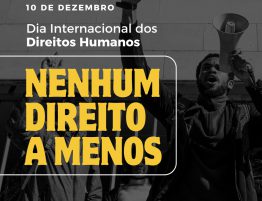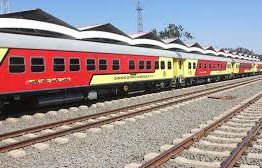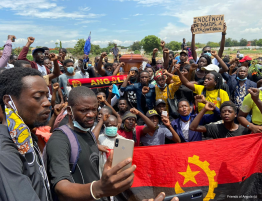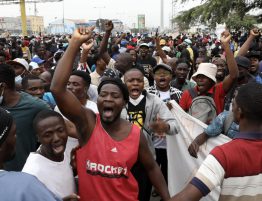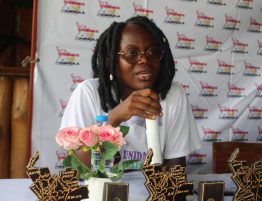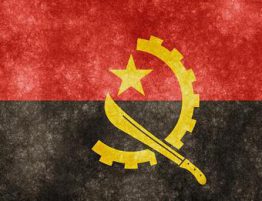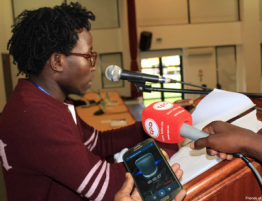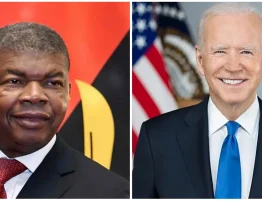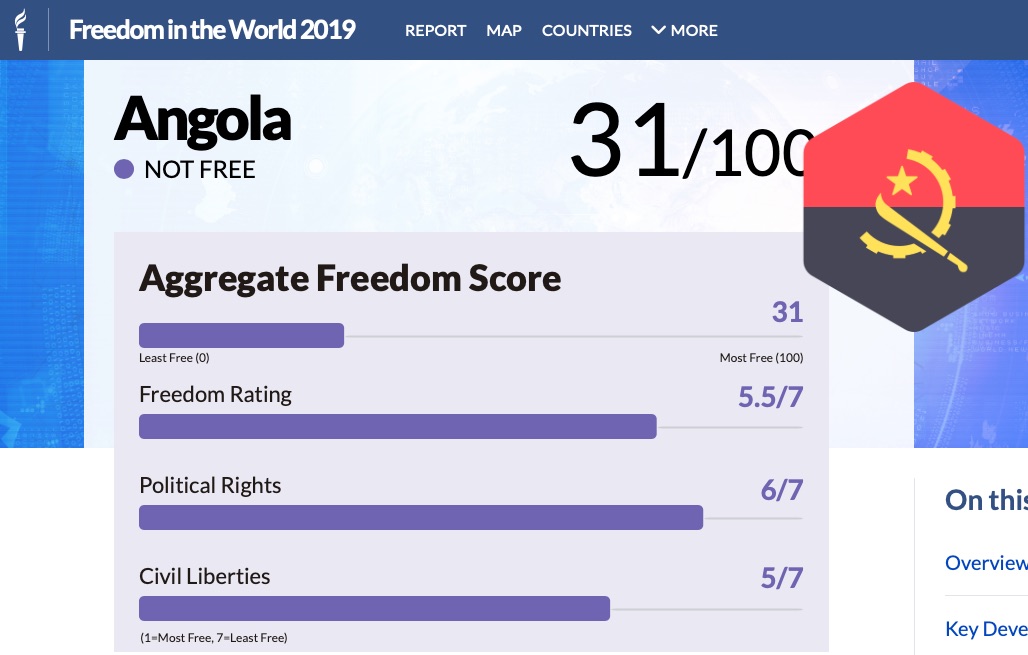
By Freedom House
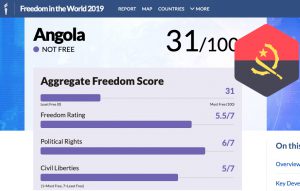
Overview:
Angola has been ruled by the same party since independence, and authorities have systematically repressed political dissent. Corruption, due process violations, and abuses by security forces all remain common. Since President João Lourenço’s election in 2017, the government has taken steps to crack down on endemic corruption and eased restrictions on the press and civil society, but serious governance and human rights challenges persist.
Key Developments:
KEY DEVELOPMENTS IN 2018:
In July, a Luanda court acquitted prominent journalist Rafael Marques de Morais and Mariano Bras, editor of the weekly newspaper O Crime, of defamation charges stemming from a 2016 story by Marques that implicated the attorney general in a corruption scheme.
In September, former president José Eduardo dos Santos stepped down as chair of the ruling Popular Movement for the Liberation of Angola (MPLA) and was replaced by President Lourenço, a move that consolidated the president’s control of the government.
Also in September, authorities arrested José Filomeno dos Santos, former president dos Santos’s son and former head of Angola’s sovereign wealth fund, for alleged fraud, embezzlement of public funds, and money laundering. Filomeno is the most high-profile figure arrested since Lourenço initiated an anticorruption campaign following his 2017 election.
Political Rights and Civil Liberties:
POLITICAL RIGHTS: 11 / 40 (+1)
A. ELECTORAL PROCESS: 3 / 12
A1. Was the current head of government or other chief national authority elected through free and fair elections? 0 / 4
The 2010 constitution abolished direct presidential elections. Instead, the head of the national list of the political party receiving the most votes in general elections becomes president, without any confirmation process by the elected legislature. The constitution permits the president to serve a maximum of two five-year terms, and to directly appoint the vice president, cabinet, and provincial governors.
In December 2016, the MPLA announced that Defense Minister João Lourenço, who was also the MPLA vice president, would be its presidential candidate in 2017. The decision was made by the MPLA’s political bureau, without public consultation. The MPLA retained power in the 2017 legislative elections, and Lourenço succeeded dos Santos, who had been in power for 38 years.
A2. Were the current national legislative representatives elected through free and fair elections? 2 / 4
Angola’s 220-seat, unicameral National Assembly, whose members are elected to five-year terms by proportional representation, has little power, and most legislation originates in the executive branch.
In the 2017 legislative polls, the MPLA won 61 percent of the vote and 150 seats, while the opposition National Union for the Total Independence of Angola (UNITA) took 27 percent and 51 seats, and the Broad Convergence for the Salvation of Angola–Electoral Coalition (CASA–CE) won 9 percent and 16 seats. Two smaller parties won the remainder. An African Union (AU) monitoring mission praised the elections’ conduct, noting that they were peaceful and that there was a broad consensus that polling preparations and processes were better organized than in past elections. However, the prevalence of biased progovernment media, deficiencies in voter registration processes, and the MPLA’s use of public resources in its campaign hampered the opposition. There were also reports of postelection violence in some locations.
Alleging grave irregularities at the National Election Commission (CNE), including manipulation of the vote count, opposition leaders called the polls fraudulent and jointly disputed the results. The Constitutional Court dismissed their claim, citing a lack of evidence. Opposition figures elected to the National Assembly ultimately took their seats—a move that prompted intense criticism from their political base.
A3. Are the electoral laws and framework fair, and are they implemented impartially by the relevant election management bodies? 1 / 4
The law states that the makeup of the CNE should reflect the disposition of power in the National Assembly, which gives an advantage to the MPLA. The political opposition, in its challenge of the 2017 election results, cited serious misconduct and a lack of transparency on the part of the CNE.
B. POLITICAL PLURALISM AND PARTICIPATION: 6 / 16
B1. Do the people have the right to organize in different political parties or other competitive political groupings of their choice, and is the system free of undue obstacles to the rise and fall of these competing parties or groupings? 2 / 4
There is a multiparty system in place, but competition is limited. The process for creating new political parties is fraught with bureaucratic obstacles and attempts at co-optation, factors that severely hinder public confidence in new parties.
B2. Is there a realistic opportunity for the opposition to increase its support or gain power through elections? 1 / 4
There is little space for the opposition to increase its parliamentary representation, much less gain power through elections. Angola has never experienced a transfer of power between rival parties. Nevertheless, opposition parties are building public support, particularly in Luanda.
B3. Are the people’s political choices free from domination by the military, foreign powers, religious hierarchies, economic oligarchies, or any other powerful group that is not democratically accountable? 1 / 4
MPLA-aligned economic oligarchies nurture a system of dependency and patronage that can subvert candidates’ and voters’ ability to freely express their political choices.
B4. Do various segments of the population (including ethnic, religious, gender, LGBT, and other relevant groups) have full political rights and electoral opportunities? 2 / 4
While societal pressures can discourage women from active political participation, women’s rights advocates have an increasingly vocal presence in political life. In September 2018, Luísa Damião became the deputy president of the MPLA, making her the highest-ranking woman in the party leadership, which has long been dominated by men.
Discussion of issues affecting LGBT (lesbian, gay, bisexual, and transgender) people are taboo, and such topics remain absent from political debate.
C. FUNCTIONING OF GOVERNMENT: 2 / 12 (+1)
C1. Do the freely elected head of government and national legislative representatives determine the policies of the government? 1 / 4
The country has been ruled by the MPLA since independence, and the president is expected to consult routinely with the party’s political bureau. Former president dos Santos retained his position as head of the MPLA for a year after President Lourenço’s election, allowing him to maintain considerable power and influence over governance. In September 2018, dos Santos was finally replaced by Lourenço as party leader, enabling the new president to consolidate his authority.
Executive powers are broad and varied, leaving the parliament to act largely as a rubber stamp in approving the president’s policies. Like his predecessor, President Lourenço frequently adopts legislation by presidential decree, including a major law enacted in May to regulate the natural-gas sector.
C2. Are safeguards against official corruption strong and effective? 1 / 4 (+1)
After decades of MPLA rule, corruption and patronage have become entrenched in nearly all segments of public and private life.
President Lourenço has stressed his willingness to fight endemic corruption since his 2017 election campaign, and a number of high-profile former officials from the dos Santos administration have been arrested. In September 2018, José Filomeno dos Santos, the former president’s son and former head of Angola’s sovereign wealth fund, was arrested for alleged fraud, embezzlement of public funds, and money laundering. Filomeno allegedly transferred $500 million in state funds to a bank account in the United Kingdom. He remained in detention at year’s end. Isabel dos Santos, the daughter of the former president, had been fired in 2017 from her position as head of the state oil company, Sonangol, whose revenues largely funded the patronage system that helped keep her father in power for nearly four decades.
Score Change: The score improved from 0 to 1 because an anticorruption drive under President João Lourenço has led to the arrests of some powerful political figures.
C3. Does the government operate with openness and transparency? 0 / 4
Government operations are generally opaque. However, Lourenço’s administration has moved to improve transparency in the notoriously corrupt oil sector. In August 2018, the oil minister announced that a new independent regulator would be established to oversee the industry beginning in 2019, curtailing the power of Sonangol. Most importantly, the regulator will manage concessions, which were still controlled by Sonangol as of 2018.
CIVIL LIBERTIES: 20 / 60 (+4)
D. FREEDOM OF EXPRESSION AND BELIEF: 7 / 16
D1. Are there free and independent media? 1 / 4
The Angolan state owns most media in the country. Many ostensibly private outlets are owned by senior officials of the MPLA and act as mouthpieces of the regime. However, in 2017, Lourenço replaced the heads of several major state-owned media outlets and called for the outlets to serve the public. In 2018, more voices gained access to the media, including civil society groups and opposition figures, and news outlets showed a greater willingness to carry criticism of the government.
In July 2018, a Luanda court acquitted prominent journalist Rafael Marques de Morais and Mariano Bras, editor of the weekly newspaper O Crime, on charges of “outrage to a body of sovereignty and injury against public authority.” The case stemmed from a 2016 story by Marques that implicated the attorney general in a corruption scheme. Observers viewed the acquittal as a step forward for press freedom, given Angola’s history of repression and intimidation of critical journalists.
Despite these improvements, the legal and regulatory environment for journalists remained restrictive at year’s end. Defamation was still considered a criminal offense, and press freedom advocates had yet to convince the government to reform the repressive legal framework.
D2. Are individuals free to practice and express their religious faith or nonbelief in public and private? 2 / 4
The constitution guarantees religious freedom, but the government imposes onerous criteria on religious groups for official recognition, which is required for the legal construction of houses of worship. Notably, many Pentecostal churches—which have had a profound social impact in Angola—remain unregistered. In October 2018, the government passed a decree giving unregistered churches 30 days to collect 100,000 membership signatures. Once the deadline passed, authorities began closing down the 4,000 unregistered churches across the country that failed to gather the required signatures, leading to an outcry among religious leaders. The decree also barred all meetings by unregistered religious groups, even in private homes.
There are no registered Muslim groups, and Muslim communities have been more vocal in their demands for recognition and the right to worship freely.
D3. Is there academic freedom, and is the educational system free from extensive political indoctrination? 2 / 4
Academics must maintain a façade of agreement with the MPLA’s preferred narratives and refrain from open criticism of the party, or risk losing their positions. Those who voice dissent are often monitored by security services.
D4. Are individuals free to express their personal views on political or other sensitive topics without fear of surveillance or retribution? 2 / 4
In recent years, there has been somewhat less fear of retribution for expressing criticism of the government or controversial opinions in private conversations. However, self-censorship persists, fueled by concerns that a perceived intent to organize against the government could result in reprisals.
While internet access is increasing in Angola, the government actively monitors online activity. Known surveillance of civil society groups, journalists, and academics can leave people reluctant to speak out.
E. ASSOCIATIONAL AND ORGANIZATIONAL RIGHTS: 6 / 12 (+3)
E1. Is there freedom of assembly? 2 / 4 (+1)
Although constitutional guarantees of freedom of assembly have been poorly upheld, President Lourenço’s government showed greater tolerance for public demonstrations during 2018, as reflected by a dramatic increase in protests and a corresponding decline in police crackdowns and arrests of demonstrators throughout the year.
Despite these advances, the authorities did arrest and detain some peaceful demonstrators. In August, for example, security forces arrested 13 separatists in the Cabinda region who were organizing a public debate on independence for the oil-rich exclave. A week after their arrest, a court dismissed the charges against them.
Score Change: The score improved from 1 to 2 due to a decrease in crackdowns on protests and public demonstrations, which encouraged people to exercise assembly rights more robustly.
E2. Is there freedom for nongovernmental organizations, particularly those that are engaged in human rights– and governance-related work? 2 / 4 (+1)
Nongovernmental organizations (NGOs) working on human rights and governance are closely monitored. The MPLA traditionally made vocal attempts to discredit their work and sometimes threatened such groups with lawsuits and outright closure, prompting many to curtail their activities.
In 2018, however, the environment for NGOs improved significantly, with a reduction in official interference. The government showed a greater willingness to engage in constructive dialogue with civil society groups. In December, Lourenço met with a number of prominent NGO leaders, including several who have been highly critical of the government.
Score Change: The score improved from 1 to 2 because NGOs, including those that were critical of the government, were able to operate with less interference from authorities, and the government showed greater receptiveness to the views of civil society.
E3. Is there freedom for trade unions and similar professional or labor organizations? 2 / 4 (+1)
Certain employees who provide services considered essential—including prison guards and firefighters, but also workers in the oil sector—may not legally strike. Unions not associated with the MPLA have faced interference and harassment. However, the government allowed more strikes to proceed without interference or repression in 2018. Notably, the National Teachers’ Union (SINPROF) organized a strike in April that resulted in a deal with the government for improved pay and working conditions. Additional strikes by nurses and workers in the justice sector also went ahead without incident during the year.
Score Change: The score improved from 1 to 2 because authorities allowed more strikes to occur without intervening.
F. RULE OF LAW: 4 / 16 (+1)
F1. Is there an independent judiciary? 1 / 4
The president appoints Supreme Court judges to life terms without legislative input. Corruption and political pressure from the MPLA contribute to the judiciary’s general inefficacy and undermine its independence. In 2018, political interference in the courts appeared to subside somewhat, as demonstrated by the acquittals of Marques and Bras, who had exposed alleged corruption among political elites, as well as the dismissal of some charges against peaceful demonstrators.
In 2017, the Constitutional Court also displayed independence by striking down a presidential decree signed by dos Santos in 2015 that imposed tighter restrictions on NGOs. However, another controversial ruling that year by the same court dismissed an opposition challenge of the 2017 election results and further concluded that claimants had forged documents they submitted to the court.
F2. Does due process prevail in civil and criminal matters? 1 / 4
Constitutional guarantees of due process are poorly upheld. Many defendants are unable to afford legal counsel, and the state largely fails to provide qualified legal aid to those who need it. Arbitrary arrest and lengthy pretrial detention remain problems.
F3. Is there protection from the illegitimate use of physical force and freedom from war and insurgencies? 1 / 4 (+1)
Security forces enjoy impunity for violent acts, including torture and extrajudicial killings committed against detainees, activists, and others, although the frequency of politicized abuses has apparently decreased in recent years. Angolan prisons are reported to be overcrowded, unhygienic, lacking in necessities, and plagued by sexual abuse.
According to government statistics, violent crime, including robberies, assaults, and homicides, has increased in Luanda in recent years.
A low-level separatist insurgency in the isolated Cabinda region continues to pose a security threat, though no major attacks were reported in 2018.
Score Change: The score improved from 0 to 1 because the frequency of politicized abuses carried out by state security agents has apparently decreased somewhat in recent years, and most residents are free from war and insurgencies.
F4. Do laws, policies, and practices guarantee equal treatment of various segments of the population? 1 / 4
Security forces allegedly harass and abuse immigrant communities, and the government has failed to adequately protect refugees and asylum seekers. In October 2018, authorities expelled more than 400,000 primarily Congolese migrants from Angola. Security forces allegedly killed dozens of people and set fire to scores of homes during the operation, which the government justified with a baseless claim that irregular migrants were responsible for illegal mining and diamond smuggling.
National law criminalizes “acts against nature,” though there have been no recent cases of this provision being applied to same-sex sexual activity. LGBT people sometimes suffer harassment, and few formal LGBT rights or support organizations exist.
Women face discrimination in the workplace that makes it difficult for them to rise to senior positions. There have been reports of abuse of women and children accused of practicing witchcraft.
G. PERSONAL AUTONOMY AND INDIVIDUAL RIGHTS: 3 / 16
G1. Do individuals enjoy freedom of movement, including the ability to change their place of residence, employment, or education? 1 / 4
Several organizations have been working to remove land mines that were placed during Angola’s decades-long civil war. Land mines inhibit agriculture, construction, and freedom of movement, particularly in rural areas.
The process for securing entry and exit visas remains difficult and mired in corruption. Individuals who are critical of the government have faced problems when attempting to leave or enter the country. Bribes are frequently required in order to obtain employment and residence.
G2. Are individuals able to exercise the right to own property and establish private businesses without undue interference from state or nonstate actors? 1 / 4
Predatory Angolan elites tend to either disrupt or co-opt emerging new businesses. Authorities at times have expropriated land and demolished homes without providing any compensation. Customary law practices can leave women with unequal inheritance rights.
G3. Do individuals enjoy personal social freedoms, including choice of marriage partner and size of family, protection from domestic violence, and control over appearance? 1 / 4
Domestic violence is widespread in Angola, and perpetrators are rarely prosecuted. Child marriage remains common, particularly in rural areas. According to 2017 UNICEF statistics, 8 percent of girls are married by the age of 15, and 30 percent are married by 18.
G4. Do individuals enjoy equality of opportunity and freedom from economic exploitation? 0 / 4
Public oil revenues are not equitably distributed or used to benefit the entire population. Rural regions in particular have inadequate infrastructure and access to services, leading to inequities in economic opportunity.
Child labor is a major problem, and foreign workers are vulnerable to sex trafficking and forced labor in the construction and mining industries. The authorities have failed to effectively investigate human trafficking or prosecute offenders.

